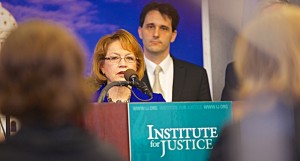Federal court puts MN campaign finance limits on hold

By Tom Steward | Watchdog Minnesota Bureau
ST. PAUL, Minn. — A St. Paul judge’s ruling will level the playing field for political donations in Minnesota, halting a law that plaintiffs argued “dishes out First Amendment rights on a first-come, first-served basis.”
Only weeks after the U.S. Supreme Court overturned federal limits on campaign donations in McCutcheon v. FEC, U.S. District Judge Donovan Frank on Monday applied that precedent to a Minnesota campaign finance law that allowed some Minnesotans to donate more than others to the same candidate in state elections.
The federal court directed Minnesota officials to halt enforcement of the state’s “special sources limit” law. Institute for Justice, a public-interest law firm, initiated the case.
DECISION APPLIES TO 2014 ELECTION: The ruling means citizens can contribute the $1,000 maximum amount to Rep. Linda Runbeck, R-Circle Pines, in her state House re-election bid this fall. Anthony Sanders, right, lead counsel for the Institute for Justice, represented Runbeck in the case.
“The government should not be using campaign finance laws to play favorites,” said Anthony Sanders, lead attorney for IJ in the constitutional challenge. “This ruling means that all Minnesotans who want to support political candidates will enjoy the same rights, no matter when in the election they make their contribution.”
Under the law, 12 contributors could donate up to $1,000 to a candidate for the state House. The 13th contributor, however, would be restricted to a donation of $500, due to a $12,500 “special sources limit” for large contributions. Similar limits with larger dollar amounts applied to candidates for state Senate and constitutional offices.
“In that manner, ‘late’ donations are arbitrarily treated differently than ‘early’ donations,” Frank wrote in his opinion. “One would assume that the thirteenth contribution to a legislative candidate in the amount of $1,000 causes no more concern of corruption than the first twelve $1,000 donations.”
The ruling will have an immediate impact on fundraising for candidates for state offices in this year’s gubernatorial and legislative races.
“The impact is that there’s going to be a lot more free speech in our elections in 2014,” Sanders said. “Candidates will be able to raise money without having to worry about how many other people have given them more than one half of the legal limit and that will allow them to spend less time fundraising and more time speaking to the voters.”
The practical impact of the federal court ruling will be apparent soon in the gubernatorial race. An Institute for Justice analysis of campaign finance reports shows Democratic Gov. Mark Dayton has nearly reached his special sources limit, long before the November election. With a maximum allowable contribution of $4,000, Dayton would soon be required to begin returning campaign donations exceeding $2,000.
“Gov. Dayton will definitely be a beneficiary of this ruling because future donors will be able to contribute up to $4,000 to his campaign, which is the same as what people have been able to contribute up to now,” Sanders said. “So it’ll have an effect on him and it’ll have an effect on Republican gubernatorial candidates. They won’t have to worry about this limit.”
In issuing a temporary restraining order, Frank acknowledged a personal difference of opinion with recent Supreme Court decisions on campaign finance issues and political speech.
“Although the undersigned may not agree with the Supreme Court’s recent line of cases on the subject of campaign finance, and their effect on the integrity of our public governmental institutions, the Court acknowledges that it is nevertheless bound by the decisions of the Supreme Court. As such, the Court finds that Plaintiffs have demonstrated that they are likely to prevail on their constitutional claim…” wrote Frank.
Minnesota Campaign Finance and Public Disclosure Board officials haven’t decided whether to appeal the decision with the Eighth Circuit Court of Appeals.
Contact Tom Steward at tsteward@watchdog.org.







